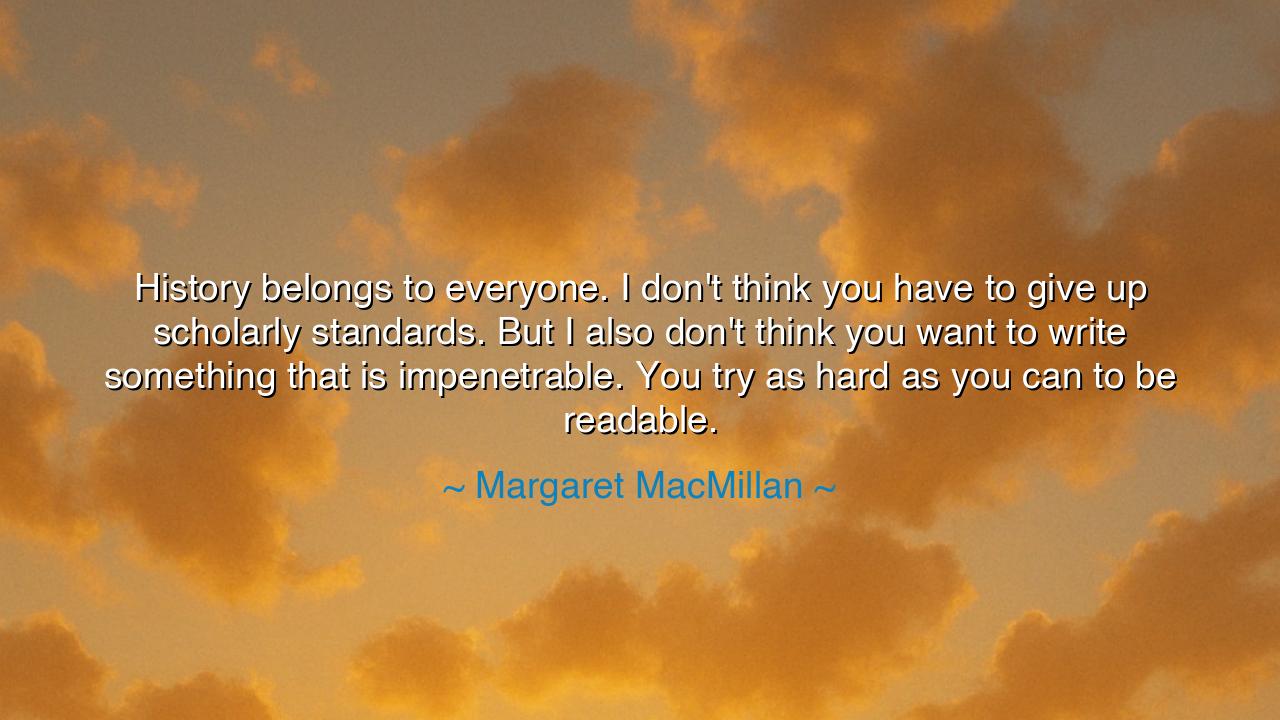
History belongs to everyone. I don't think you have to give up
History belongs to everyone. I don't think you have to give up scholarly standards. But I also don't think you want to write something that is impenetrable. You try as hard as you can to be readable.






When Margaret MacMillan, the historian of empires and memory, said, “History belongs to everyone. I don't think you have to give up scholarly standards. But I also don't think you want to write something that is impenetrable. You try as hard as you can to be readable,” she was proclaiming a creed both humble and revolutionary. Her words are a torch held high in the great temple of knowledge, reminding us that history, the story of all humanity, is not the private treasure of the learned few — it is the inheritance of every soul who walks upon the earth. For if history belongs to us all, then its telling must also speak to us all.
The origin of this quote lies in MacMillan’s lifelong mission as a historian to bridge the world of scholarship and the common heart. A descendant of the great Lloyd George, she carried within her not only intellect, but also empathy — a sense that history is not merely a record of events, but the pulse of civilization itself. Through her works such as Paris 1919 and The War That Ended Peace, she sought to make the past not distant or abstract, but alive — filled with the ambitions, mistakes, and moral questions that still shape us. Her quote emerges as a call for clarity and compassion in scholarship, a reminder that truth must not be locked behind the walls of academic pride, but shared as light among the people.
When she says, “History belongs to everyone,” MacMillan does not mean that it should be diluted or simplified into slogans. Rather, she insists that truth and accessibility must walk hand in hand. The historian’s duty, she teaches, is to guard the rigor of facts while making them humanly intelligible. For knowledge that cannot be understood by the people serves no one; it becomes like a relic buried in the ground — precious, but lifeless. The ancients, too, knew this truth. Herodotus, the father of history, wrote not for scholars, but for listeners by the fire — so that they might remember who they were, and why they must not repeat the follies of their ancestors.
Consider the story of Anne Frank, whose diary has become one of the most beloved and tragic records of the Second World War. Her words were not written as academic testimony — yet they have taught more about the cruelty of persecution and the endurance of hope than many volumes of analysis. Through her simple, unguarded truth, millions have seen history not as data, but as human experience. In this, she embodies MacMillan’s ideal: history made readable, alive, and profoundly personal. The scholar must learn from the child — for clarity is not the enemy of depth; it is its fulfillment.
MacMillan’s words also stand as a rebuke to arrogance in knowledge. Too often, the learned build towers of language so high that no ordinary person can climb them. The past, then, becomes the possession of a few — distorted, untold, or forgotten by the many. Yet the power of history lies precisely in its shared ownership. Every nation, every village, every family carries its story — and each story, however humble, contributes to the great mosaic of humankind. The true historian listens to the voices of kings and peasants alike, for all are co-authors of the human chronicle.
And there is more: to be “readable” is not merely to be simple, but to be honest and humane. MacMillan’s plea is moral as well as intellectual. She calls upon those who write about the past to remember that they write for the living — that every retelling of history carries the power to heal or to harm, to divide or to unite. The clarity she demands is the clarity of sincerity — a truth that does not hide behind jargon or pride, but steps forth with humility and grace.
So, O seeker of wisdom, remember this: if you wish to know your world, study its history; and if you wish to serve your world, share its history. Speak of the past not as a fortress, but as an open field, where all may walk and learn. Let your knowledge be rigorous, but never cold; let your writing be clear, but never shallow. For every generation that understands its past gains strength against ignorance, and every teacher who makes history readable builds a bridge between time and truth.
Thus, in the spirit of Margaret MacMillan, let us keep faith with the storytellers who came before — the chroniclers, poets, and teachers who refused to let the memory of humanity fade into silence. Let us remember always that history belongs to everyone — and it is our sacred duty to tell it not as gatekeepers, but as guardians of the shared human flame.






AAdministratorAdministrator
Welcome, honored guests. Please leave a comment, we will respond soon